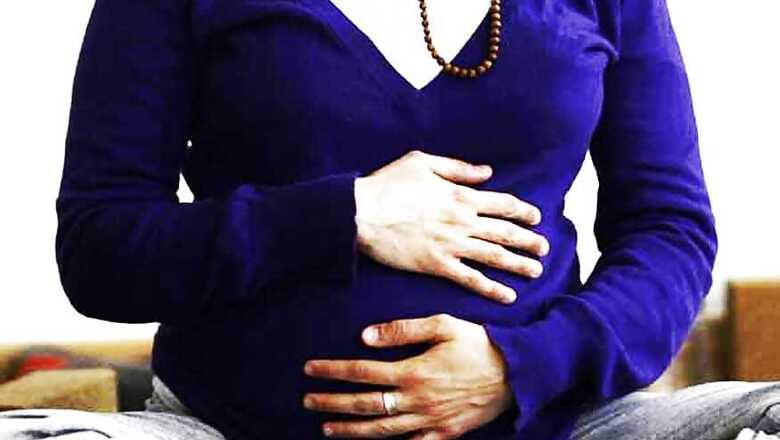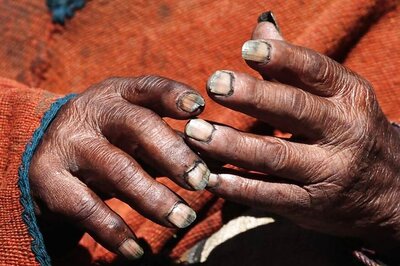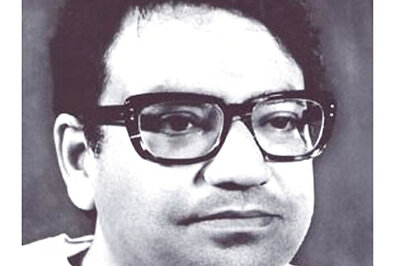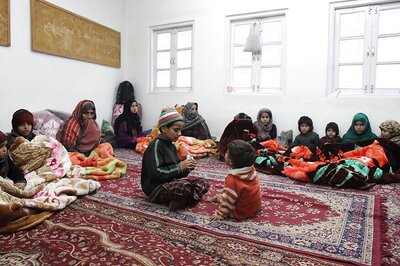
views
"Three months into my pregnancy, I suffered a miscarriage. When I started bleeding profusely, my husband rushed me to the hospital, but it was too late. By then, I had already lost my baby,” said Gayatri (name changed), a resident of Mumbai.
"They kept my baby (foetus) in a jar at the hospital. After I returned home, all I longed for was to see that jar again. I just wanted to run to the hospital to see my baby," she added.
Gayatri, like several other women across the world, went through the horror of losing a child even before giving birth. Reportedly, an average of 15 per cent of all clinically diagnosed pregnancies result in such spontaneous losses or miscarriages. In many cases, these pregnancies are lost even before a woman realises that she is pregnant.
Gayatri, however, was preparing to welcome her first child home when the miscarriage happened. "After I became aware of the pregnancy, all I did was think about that child," she recalled. "I completely lost my mind after the miscarriage. It was truly the worst experience of my life. I cried all day long for an entire month. My husband tried to comfort and console me. He said, 'We can't do anything. It happened.' But I couldn't digest the fact that I didn't have the baby anymore, that I will never hold it in my arms."
Gayatri confessed that after her miscarriage, grief blinded her and made her incapable of rational thoughts. She said she threw her mother and brother out of her house because she thought their visit during her pregnancy brought her bad luck.
Arti Sharma, a clinical and counseling psychologist, said that in most cases, women who miscarry experience a frighteningly emotional and physical reaction, similar to what Gayatri experienced.
"I have had patients who express psychosomatic symptoms after they suffer through miscarriages. They go through intense grief, and sometimes even psychosocial distress," said Sharma.
"Some of them find themselves depressed or angry. Even guilt and self-blaming happens in several cases when the woman feels that it is she who is responsible for it. After a miscarriage, a woman's brain turns extremely vulnerable due to grief, and she often finds all sorts of illogical reasons to blame herself. In one case, a woman I counselled believed she lost her baby during pregnancy because she had sexual relationships before marriage," Sharma pointed out.
Since Indian families mostly deal with miscarriages by brushing them under the carpet, women rarely visit counsellors after such mishaps. In fact, Sharma pointed out that most of her patients who have had miscarriages, and were deeply affected by them, came into therapy only because they have problems conceiving another child, or for completely different reasons. It was during the therapy sessions, however, that they opened up about their past miscarriages.
"Firstly, there is tremendous self-doubt. They question their ability to become mothers again, and in some cases, their loss of child also make them question the stability of their marriage," said Sharma.
Due to our social conditioning, some women automatically assume that one of their responsibilities is to give birth. Therefore, when they lose a child, they also tend to get insecure that their partners would leave them and marry someone who will be able to give him a baby, pointed out Sharma.
"While in most cases these worries are ill-founded, there are a few families, who blame the daughters-in-law for losing the child and even push their sons towards remarrying someone who will be able to give the family an heir. Sometimes, even the couple fights over a miscarriage and a blame-game starts," said the psychologist.
Counselling generally helps, but in some cases, Sharma has to put the women on medication. "In two or three cases, I discovered that after these women have difficulty conceiving, they tend to opt for adoption," she said.
Rimpy Baid from Jaipur gave birth to a boy after going through a miscarriage at the age of 21. She, too, is wary of conceiving for the third time, because of the nightmarish experience of her miscarriage.
"It still gives me jitters to think of the day I miscarried," said Baid. "I was working in the kitchen when my help asked me if I had hurt my legs. When I looked down to see what she was talking about, I realised blood was dripping down my legs. Blood spatters marked the kitchen floor, but I couldn't immediately rush to the washroom, because a few guests were visiting. When I finally went to the washroom, it was awash with blood. I had never seen so much blood in my entire life." recalled Baid. "After my miscarriage, my gynaecologist told me it was nothing but lump (It had just been a month-long pregnancy). I, however, felt like it was a part of me. It's been so many years now, but I still don't know how to react when I think about those days."
Baid's boy, who was born a year after the miscarriage, is 12 years old now. "I never planned a third child. Whenever I think of becoming pregnant, that bathroom floor flashes in front of my eyes. I worry that if I become pregnant and miscarry again, or worse still if something happens to me during pregnancy, who will take care of my son?"
Baid said she and her husband always wanted a girl child. "I wanted two kids, I wanted to complete my family, but I cannot jeopardise what I have now, for a future that is not even certain."
"There is a lot of stress and anxiety that women who miscarry experience, so when they try to conceive again, they should do it under Tender Loving Care (TLC)," said Dr Ameet Patki, medical director of Fertility Associates and Chairperson of RCOG (Royal College of Obstetricians and Gynaecologists), India. It is important to make a stress-free, and loving environment and provide these women with support systems -- be it counselling or support groups -- to dispel their fears of pregnancy that they often develop.
"The minute they realise they are pregnant, their anxiety level shoots up because the deja vu of earlier miscarriages come back to haunt them. Therefore, some of these women need to be under TLC even before they become pregnant. Apart from that, during the period of pregnancy, it is important that they have a single point of contact as far as the doctor is concerned so that they feel assured. Frequent sonography can also prove helpful," said Dr Patki.
"While 15 per cent women are likely to suffer a miscarriage, up to two per cent of them will go on to have a second, third or even fourth miscarriage. This becomes a unique group called recurrent spontaneous miscarriage (RSM)," the doctor pointed out.
An epidemiological study by Dr Patki and Naveen Chauhan was done to determine the prevalence and risk factors associated with recurrent spontaneous miscarriage in India. The study, which was published in the Journal of Obstetrics and Gynecology of India, was conducted across various centres where more than 600 women who had experienced miscarriage were surveyed. It was found that the chances of reoccurring miscarriages are higher in Indian women as compared to that in the west.
"About 50 per cent of the times, the reason for miscarriage is the abnormalcy in the pregnancy itself. Nature, in that sense, is kind to women because it doesn't allow an abnormal pregnancy to go forward," said Patki.
"But in the case of RSM, the causes can be different. One, of course, is genetic. If one of the parents has genetic abnormalities, then it gets carried forward to the next generation. The second cause is infections. In our country, tuberculosis is the biggest cause of RSM. The third reason is a structural defect in the uterus which holds the pregnancy, like multiple fibroids. The fourth cause is autoimmune diseases. The pregnancy is half foreign to the mother's body because half of it comes from the father. So sometimes, the immune system gets triggered off. Hormonal metabolic imbalance can also cause RSM," he added.
Madhu (name changed) from Kolkata experienced two back-to-back miscarriages because of recurring infections. She miscarried on both instances because of pox. Those were pregnancies that she and her husband hadn't planned for, but when the miscarriages happened, she said, "It took a higher toll on me than actually giving birth to a child."
"It is the strangest feeling … I cannot describe the emptiness of it. The pain of the mind overrides your body," she said.
"You cannot lose something you didn't quite have, in fact, didn't even want to have to begin with. But you still feel like you are almost a mother somehow. A mother who has lost a child of hers forever," she added.




















Comments
0 comment